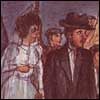Life is full of surprises. Surprise birthday parties, gifts, and visitors all make life colorful and interesting.
And then there are other kinds of surprises that life tosses our way. A driver that suddenly swerves into your lane, an outrageous utility bill, or an unexpected critical comment from your spouse can cause our blood pressures to climb through the roof and trigger angry responses.
Our sages teach us that the true character of an individual is revealed in three ways: his attitude towards money, when inebriated, and in moments of anger (b'kiso, b'koso, b'kaso). Anger is a human emotion, but learning how to deal with it the right way is vital. Human beings, created in the image of G‑d, have the capacity to choose how to react when their buttons are pressed. Some of us, however, find it more difficult to control our anger than others.
Emotions travel at a faster speed than intellect. Therefore, if we want emotion and intellect to meet, the intellect ought to begin the journey first.
If a person is prepared for a challenge before it arises, he will have the tools to deal with it. But how can one deal with a situation before it happens?
As we go through life, we adopt different patterns of reacting to the discrepancy between our expectations and what we actually get. These reactions can include anger, anxiety, withdrawal, blaming or any number of automatic emotional responses. By becoming more aware of our habitual patterns, we can take control of them and become proactive rather than reactive to these stimuli. If we are aware of a certain recurring pattern of what triggers our emotional response, we can take response-ability by visualizing the situation beforehand and using our intellect to deal with them in a positive way.
The students of Rabbi Yisrael Meir Kagan,– known as the Chofetz Chaim – shared an interesting incident they encountered with the rabbi. These students noticed that the Chofetz Chaim often entered the synagogue, opened the Holy Ark and prayed. One night, they hid under a bench in the synagogue, and waited silently for the Chofetz Chaim to appear, so that they could hear what his prayers were about.
Imagine their surprise when they heard the Chofetz Chaim pleading, "Master of the Universe, help me overcome my anger. Help me, help me."
In his later years, the Chofetz Chaim traveled around Europe selling the holy books he authored. Once, between the afternoon and evening prayers, a young man approached the rabbi an asked him if he could give him four rubles in exchange for a five-ruble note.
"Why?" asked the Chofetz Chaim.
"You see," the man replied. "While you were praying I took one of your books, and now I'd like to pay for it."
"I don't know, I wasn't here," replied the rabbi. "I can't take money on a doubt."
"The truth of the matter is, I never took the book, but since I wanted to gift you with some money, I thought this was a good way."
"I cannot accept gifts. 'Someone who hates gifts will live long,' says the Proverbs. But if you'd like, you can give a donation for the Yeshiva."
"That's fine. But I don't have too much. I have here a five ruble bill; if you can give me four rubles change, I'll give you a ruble."
The Chofetz Chaim removed his strongbox where he kept all his money. Suddenly, the man seized the box and took off with it.
Inside the box was four hundred rubles that the Chofetz Chaim had managed to put together in order to publish the next edition of his magnum opus, the Mishna Berura.
Onlookers began to pursue the thief, but the Chofetz Chaim stopped them. "Leave him be. Maybe he has a daughter he needs to marry off."
The story is poignant because it portrays the rabbi's Ahavat Yisroel, his loving-kindness for another Jew, and how he judged others favorably. But beyond that, consider the level of tranquility the Chofetz Chaim had achieved. The same rabbi, who in his early years beseeched G‑d to help him overcome his natural trait of anger, when faced with the utter surprise of losing his entire lifesavings, didn't lose himself for even a minute!
Five tips for managing anger:
- Keep a solution oriented outlook. Rabbi Simcha Wasserman used to say: You can get angry or you can solve the problem, but you can't do both.
- The holy Arizal said that when a person is angry, he should look at a small child and that will calm him down.
- If you cannot stifle your anger, at least delay its expression. Don't react immediately. The Alter of Kelm used to have a special coat that he called his "garment of anger." Whenever he was angry he went to the closet to put on this garment. By that time he had already calmed down.
- After the storm blows over, express your feelings in a healthy, non-confrontational manner. Stewing in anger never helps anyone.
- Take quiet time for yourself at regular intervals. Go swimming, walk, read a book. Quiet is the condition under which the intellect functions best. If our actions and reactions are to be rooted in the intellect, it's important to make quiet moments a part of our daily lives.








